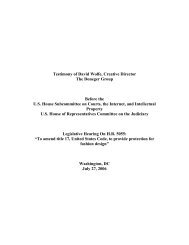What Every Citizen Should Know About DRM, aka - Public Knowledge
What Every Citizen Should Know About DRM, aka - Public Knowledge
What Every Citizen Should Know About DRM, aka - Public Knowledge
Create successful ePaper yourself
Turn your PDF publications into a flip-book with our unique Google optimized e-Paper software.
III. <strong>Should</strong> <strong>DRM</strong> Be ImposedBy the Government?utility programs that enabled the defeat of suchmeasures quickly appeared—for several years therewas an ongoing “arms race” between commercialsoftware vendors, who developed ever more powerfuland arcane copy-protection strategies, and themakers of copy-protection-defeating utilities. Generallyspeaking, however, digital information isinherently copyable and inherently alterable, whichposes special problems for the copyright holderwho seeks to prevent his or her digital work frombeing copied or altered.In the same period, the general-purpose natureof personal computers was what created the greatestnumber of business opportunities for softwaremakers. Because the leadingpersonal computers atIn the 1980s, computerindustrycompanies moved — most notably the Applethe beginning of themicrocomputer revolutionII (1978) and the IBM PCaway from the more rigid (1981) — were designedto be “open platforms,”and restrictive types of this meant that third-partysoftware vendors were<strong>DRM</strong>. able to freely develop newapplications for those platforms.(One of those vendors,Microsoft, has been so successful at this thatits revenues currently exceed those of any singlecomputer maker.) At the same time, efforts tomeet consumer needs by promoting dedicatedword processors and other dedicated digital toolsfailed in the marketplace, with the notable exceptionof game consoles. In general, when it comesto computing, the public prefers general-purpose,unconstrained, “open-platform” tools to specialpurpose,limited ones. We may reasonably infer,therefore, that any government mandate thatfocuses on limiting the functionality of generalpurposecomputing tools may have the unintendedeffect of diminishing the market for the resultingproducts. A mandate might also prime an aftermarketfor pre-mandate “open architecture”devices, perhaps via auction websites such as eBay.The Advantages of SellingSoftware Rather Than ContentSoftware makers in the 1970s and 1980s had certainadvantages when attempting to block softwarecopyright infringement. The first and mostimportant advantage was the fact that most commercialsoftware that is capable of performingcomplex tasks requires a significant degree of documentationand support; bona-fide purchasers ofsoftware were able to receive such benefits,whereas those who made unlicensed copies typicallyhad to do without. This led to another aftermarket,this one in third-party manuals andworkbooks for commercial software products.That aftermarket continues to this day, somewhatto the chagrin of software vendors. Nevertheless,software makers have generally abandoned theharsher varieties of copy-protection schemes toprevent unauthorized software copying, largelybecause of negative consumer response. A fundamentalprinciple of the personal-computer business— the principle of High Volume/Low Cost— drove vendors away from the more rigid andrestrictive types of copy protection; the vendorsmanage the problem of “le<strong>aka</strong>ge” partly by seekinglegal remedies against the more egregiousinfringers, partly by making software more affordableand thus easier to acquire legally, and partlyby employing measures such as registrationschemes that make illicit copying somewhat moredifficult for ordinary users.But the other advantages for software makerswere also considerable: modem speeds were comparativelyslow, computer storage was comparativelyexpensive, and relatively few consumers hadaccess to the Internet. All of these advantages evaporatedin the late 1980s, in the 1990s, and in thecurrent era, as modem speeds increased by ordersof magnitude, computer storage became increasinglycheap, and access to the Internet becameubiquitous. Indeed, current telephone modems,fast as they are, are likely to be supplanted by highspeedbroadband connections to the Internet,which are becoming increasingly available to mostbusinesses and homes in America.These factors compounded the problems of digitalcopyright holders in a number of ways. First of20





